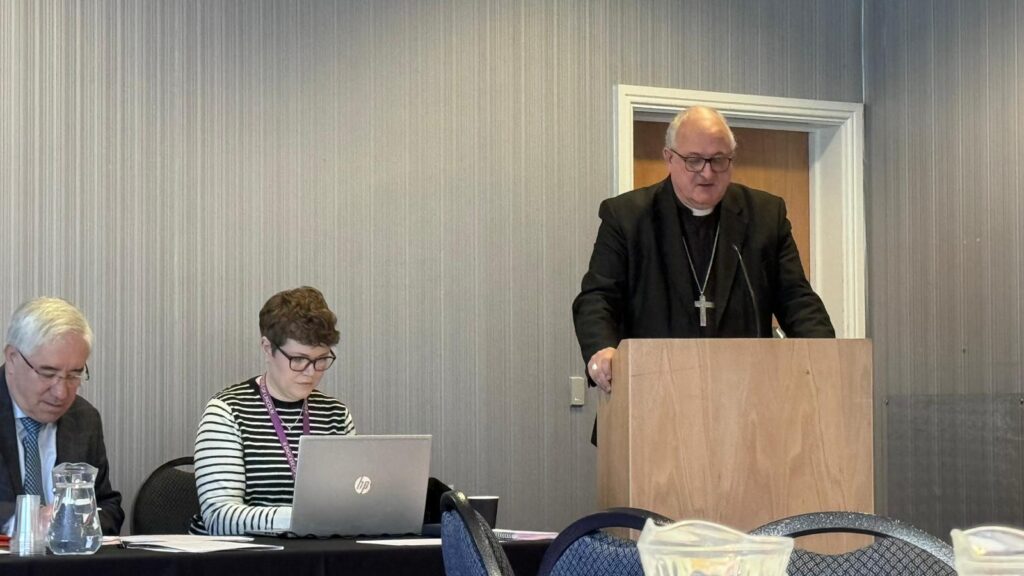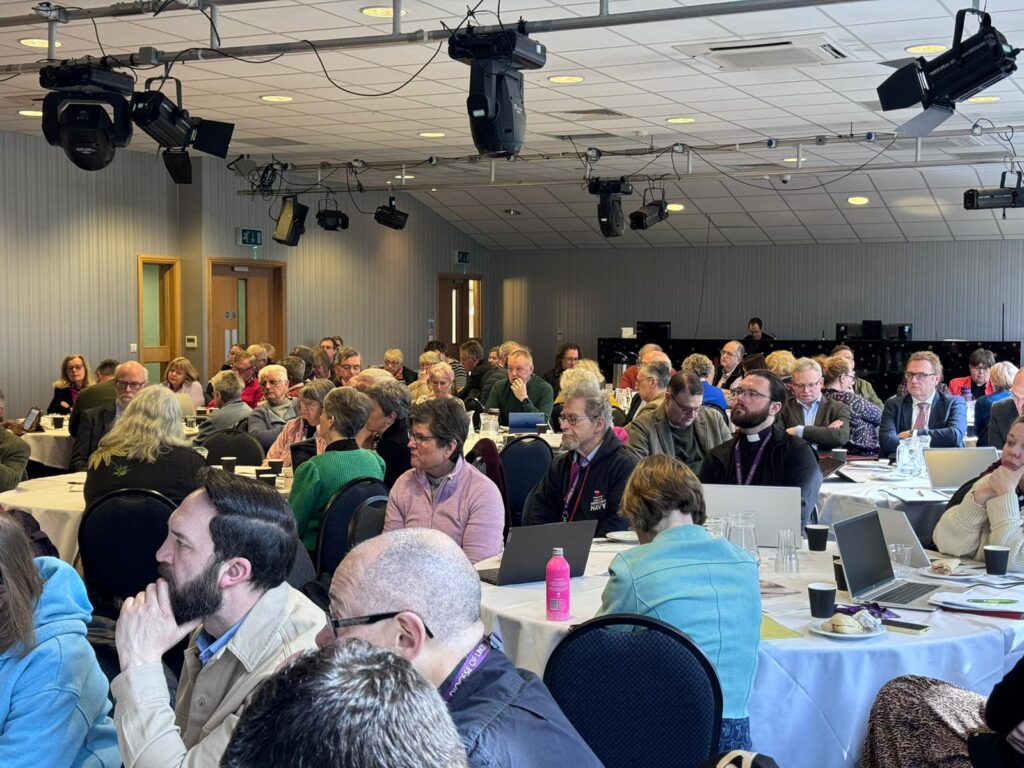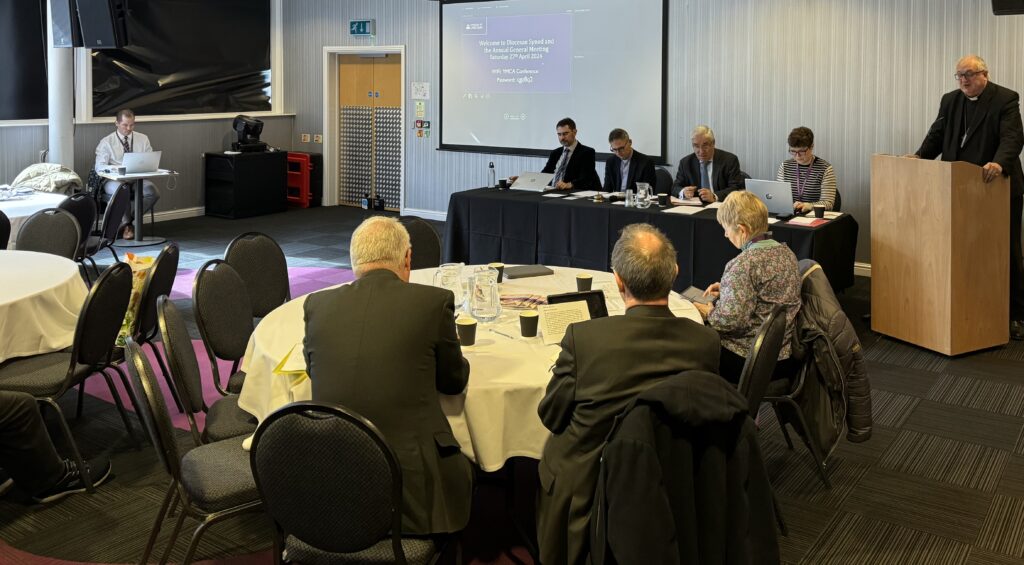The Bishop of Lincoln announces Minister in Charge of Stamford St Mary and St Martin (Rector Designate of Stamford St Mary and St Michael)
The Bishop of Lincoln is pleased to announce the appointment of the Father Ed Martin as…
Read the storyPresidential Address from the Bishop of Lincoln
In our Gospel reading tomorrow we will hear the invitation to abide in Christ.
This invitation – to find our life in Christ – permeates the Easter season. We hear the Risen Christ speaking the name of Mary in the garden. We see him walking with the disciples on the road to Emmaus, breaking bread and opening up the Scriptures. We find him waiting on the shore for the disciples and inviting them to ‘come and have breakfast’.

This invitation is one we need to hear – especially now, in times of uncertainty, change, anxiety.
One of the themes I often return to is our understanding of being called and sent. We often talk about God’s call to us – we also need to remember that goes hand in hand with being sent out to get on with the work.
There’s also an important third aspect that we mustn’t forget. Just as we are called by God, and sent out into the world as ambassadors of the Gospel, so God also calls us back – for healing, renewal and refreshment. In the gospels, Jesus sends out his disciples as labourers in the harvest. They return with joy – but I also wonder if they returned with an element of weariness. There must be a reason why Jesus says ‘Come to me, all you who are weary and burdened, and I will give you rest…’
Look at the world around us – there is much to weary the human soul.
Recent decades have seemed to be a time of relative peace and prosperity – though it was only a veneer, covering up true tensions and strife bubbling away underneath, which are now beginning to erupt. There are flashpoints of war all around: China and Taiwan, Russia and Ukraine, the Middle East, South Sudan and the DRC.
We even find ourselves wondering about the risks of a new European war. Experts are talking about a real if small chance of such a war. We may comfort ourselves with the thought that the threat is not currently seen as great… but any threat brings me up short. We may not be in the territory of 1939, but are we actually in the territory of 1938…?

Where is the Church in this? It is increasingly unfashionable to admit to the need for greater religious literacy in understanding what is happening in the world, and yet the religious dimension to human activity is inescapable.
A terrifying image leaps to mind – that of the patriarch of Moscow recently proclaiming religious cause and justification to the invasion of Ukraine. It heralds an ideology known as ‘Russkiy Mir’ – meaning ‘Russian world’. It once had the appearance of promoting Russian culture, values and history, but at its heart lies an unreflective patriotism and an assertion of Russian identity beyond current borders. It gave Patriarch Kirill the platform to declare of the conflict in Ukraine:
“This is a Holy War, in which Russia and its people are fulfilling the mission of protecting the world from the onslaught of globalism and victory by a West which has fallen into Satanism.”
I contrast this disturbing claim with the words of Bishop George Bell, speaking out in 1940 to remind the Church of its vocation even in the horrors of war:
“The Church offers the world the gospel of the Incarnate, Crucified and Risen Christ. This is no special war-time gospel. It is the gospel for human needs in all times and countries. If it is for us, it is also for our enemies. It applies equally to every time and place… In a word, it is the function of the Church in war-time to still be the Church.”
We may not be a Church in war-time, but we are still called to be the Church during testing times.
Closer to home, I am conscious of the rising threat posed to Greater Lincolnshire by climate change, and the question that lurks in the shadows of my mind – are we too late? Is the damage already done? We recently had the honour of a visit from Archbishop Sione and our friends in the Diocese of Polynesia to discuss plans for a second Moana conference in Fiji this summer, exploring our shared concerns around inundation, as well as building resilience and security in areas of need such as food, energy and water.
I recently attended a celebration at Epworth to recognise the ministry of Revd Alan Robson, who has served as the agricultural chaplain across Lincolnshire for 25 years. In a diocese where agriculture makes up so much of our common life, this special day gave me cause to think about our own contribution to this kind of chaplaincy in the future? Farming and agriculture are intimately connected with Lincolnshire life – how are we to respond to their needs? Let alone future threats of devastating inundation, repeated flooding in parts of the County have left fields impossible to plant and crops impossible to reap. If we are still to be the Church for Greater Lincolnshire, then how are we pastorally supporting our farmers and agricultural industries through a time of crisis. I note that existing flooding and current economic factors are making life hard for farmers now, and I was surprised to learn recently that the average age of farmers today is in fact 72. How is the Church still to be the Church?
That brings me rather neatly onto Time To Change Together. TTCT is our response to that very question – how is the Church still to be the Church when the world is changing around us?

We are committed to completing the first phase of TTCT by the end of next year, and we are on track to do so. I am encouraged by my visits around the diocese, meeting with parishioners and ministers, seeing the places where their life and ministry are rooted, and hearing both anxieties and hopes. We have been busy laying strong foundations, with Local Mission Partnerships exploring how they can flourish together, and generous giving by individuals and churches contributing directly to ministry on the ground.
The only job description I was given by the Bishop of Salisbury when I became his suffragan was to wake up every morning and be joyful in the Lord. As the baptised people of God, we all have a ministry – a common vocation to love and serve the Lord and to find our joy in Him. The good news we share is always about Jesus and only about ourselves as found in Him. Within that calling, we are looking at releasing the particular ministries we call Oversight and Focal – which we believe is crucial to seeing the hopes of TTCT come to fruition. If Oversight Ministry is about holding the vision and equipping others to do the work of the Kingdom, then Focal Ministry is about that work, rooted in particular communities and church buildings, of worshipping God and serving one another. I want to see a diverse and contextual range of focal ministry – we’re not going for a one-size-fits-all approach – but a vast array of people called and invited to be the named and recognisable ‘person’ leading and caring for our church communities.
And finally, we need to be preparing for the next steps. What does Phase Two of TTCT look like? How are we going inhabit all that we have built together once it is done? Don’t forget the Church is still called to be the Church – we have a gospel to proclaim. We are called to share the good news of the Kingdom across the communities of Great Lincolnshire. In phase two, I want to focus on building discipleship – making new disciples as Our Lord calls us to do, AND growing in confidence in our own discipleship – That is, in our life of prayer and worship, in our learning, in our acts of service – how do we raise the spiritual temperature in the Diocese of Lincoln?
Let me finish by connecting the dots:
The full digest from Diocesan Synod will be available on our website in the week after the meeting.
The Bishop of Lincoln is pleased to announce the appointment of the Father Ed Martin as…
Read the storyThe Bishop of Lincoln is pleased to confirm that The King has approved the nomination of The Revd Canon Dr Simon Jones as the next Dean of Lincoln.
Read the storyAnn Treacy is moving onto pastures new from Thursday 11 April 2024 after nine impactful years in the role.
Read the story